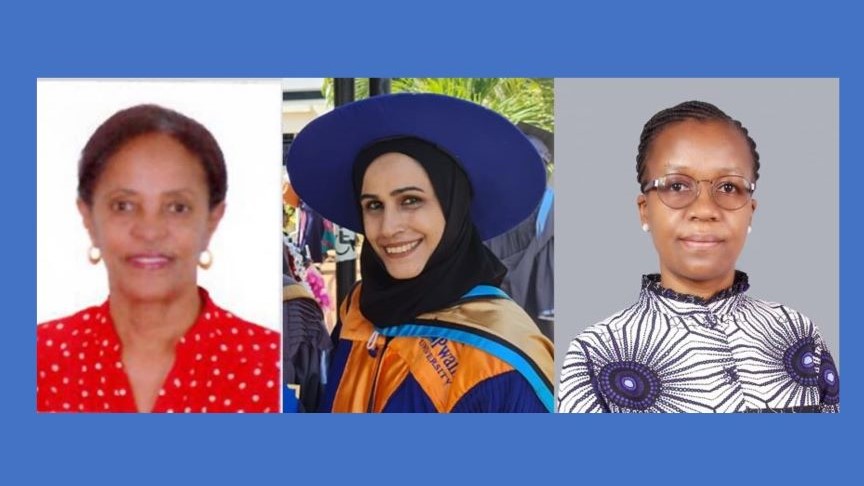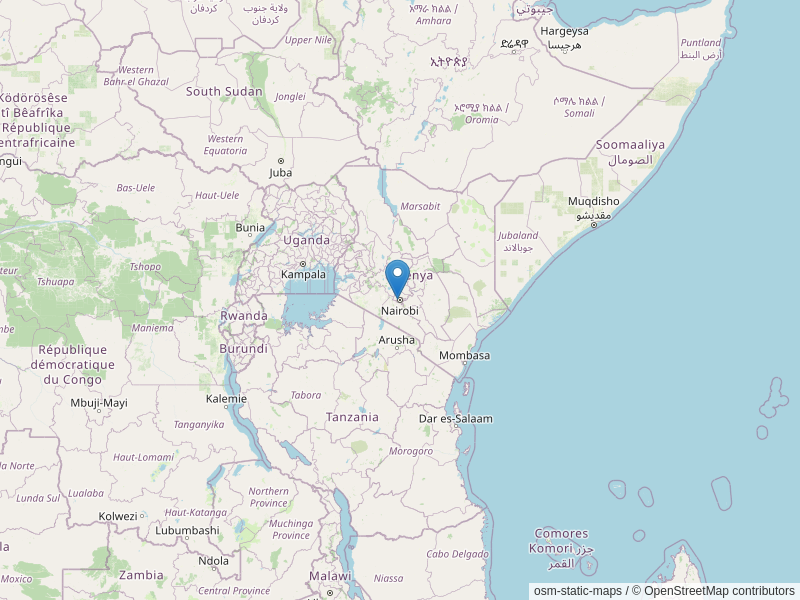Women in science: Introducing Prof. Yalemtsehay Mekonnen from Ethiopia, Prof. Suhaila Hashim from Kenya, and Dr. Beatrice Tarimo from Tanzania

Professor Yalemtsehay Mekonnen from Addis Ababa University was one of the first women in the natural sciences from the Global South to get a grant from the DAAD. She was also one of the first women to work as a professor in Ethiopia. She received the African Union Kwame Nkrumah Scientific Prize in 2015 for outstanding contributions made by women in science.
Professor Suhaila Hashim is currently the Manager of the Pwani University Biosciences Research Centre. She is Programme Co-ordinator of the DAAD funded MSc. Bioinformatics Programme at Pwani University and a member of the Biochemistry & Biotechnology Professionals Society of Kenya.
Doctor Beatrice Tarimo is a Fully Registered Land Surveyor with the National Council of Professional Surveyors (NCPS) in Tanzania, with extensive experience in Geomatics and Natural Resource Management. She is a Lecturer in the Department of Geospatial Sciences and Technology at Ardhi University. She contributes to climate change and other ongoing global changes to improve living conditions while achieving sustainable development.
Please introduce yourself! What position do you hold, and what is your area of expertise?
Yalemtsehay Mekonnen:
I’m Yalemtsehay Mekonnen, and I’m a senior professor in the Department of Zoological Sciences at Addis Ababa University’s College of Natural and Computational Sciences. My area of expertise is in cell and human physiology.
Suhaila Hashim:
I am an Associate Professor at the Department of Biochemistry and Biotechnology at Pwani University. I am currently the manager of the Pwani University Biosciences Research Centre (PUBReC). I am also a Co-Principal investigator of the Eastern Africa Network for Bioinformatics Training (EANBiT), which supports our MSc. Bioinformatics programme at Pwani University. I am enthusiastic about research and mentoring and have extensive expertise in administration and management.
Beatrice Tarimo:
I have been the Director of the African Center for Sustainable Cities Studies at Ardhi University since March 2022. Prior to this position, I was the Head of the Department of Geospatial Sciences and Technology from 2016 to 2022. My area of expertise is generally geomatics, but in recent years I have focused more on the use of Earth Observation and contemporary Geospatial techniques in my teaching and research practices.
Prof. Mekonnen, please tell us more about your academic journey. You were one of the first women to pursue an academic career at a time when it was not common. What challenges did you face, and how did you overcome them?
Yalemtsehay Mekonnen:
I am one of the luckiest girls in my generation to have gone to school at a young age. The reason for this is that my father was a police officer and was educated himself. My grandmother from my father’s side was also literate. So they knew the benefits of education. My mother was also a self-educated lady, having learned how to read and write at home without going to school.
I was able to go to all education systems without much problem, though the challenges were all around me. In my teenage years, some of my friends got married. For me, going to higher education was my passion, and I knew I would be able to do it from the beginning. After getting my first degree in biology, I got married and had my first child, who joined me for my master’s at Addis Ababa University, where I was employed as a graduate assistant. After I had my second child, I left for Germany to do my Ph.D. So, the challenge was to handle multiple responsibilities. That is taking care of my family, teaching, and doing research at the university. I also had leadership responsibilities after I got my Ph.D. with a DAAD scholarship at the University of Heidelberg back in 1992. The key to my success is that I work hard, use my time effectively, and do not give up on obstacles that are man-made, cultural, or unfavorable in terms of institutional rules and regulations. I try to be smart with a positive attitude.
Prof. Hashim, please tell us more about your academic journey as a woman—what challenges did you face and how did you overcome them?
Suhaila Hashim:
I pursued my Bachelor’s and Master’s degrees in Biochemistry at the University of Nairobi.
During this time, there were no universities in the coastal region. Being a day scholar and having lived all my life with my family, I had to leave the comfort of our home and Mombasa town and learn to adapt to living in a much bigger city, Nairobi. I had to learn to be responsible and remain focused on my studies. It is always a great challenge for the youth to handle this “new-found freedom”, where suddenly there is no one to report to. I would see a lot of my classmates fall prey to distractions, leading them to drop out of campus.
My Master’s programme was supported by the DAAD, for which I am ever grateful, as the funding enabled me to complete my studies and paved the way for my Ph.D. fellowship in Biotechnology at Lund University, with funding from the Swedish International Development Cooperation Agency (SIDA).
My arrival at Lund University caused quite a stir – a young Muslim girl from the coastal region of Kenya who came to Sweden all by herself to do her PhD! This helped to put into perspective the common prejudice that Muslim girls do not have the same opportunities as their male peers. As a student from Kenya, I also corrected the image of ethnicity: Whenever I met new people, I got responses like “You don’t look Kenyan.”
Living in Sweden was a wonderful experience. I met students from different nationalities and cultures. I learned a valuable lesson while there: being true to yourself, your values, and your principles earns you great respect! I believe I was a great ambassador to my beloved country, showing that Kenya is multi-ethnic and multi-cultural and living up to the reputation that Kenyan students are smart, ambitious and very fluent in English.
How about you Dr. Tarimo?
I was fortunate to be able to progress from one stage to another in my academic journey without much difficulty. But for most of my education after ordinary-level secondary school, I was in classes with more men than women. In Tanzania, the geomatics field has traditionally been dominated by men. Because of this, female enrollment rates were lower in the past, but this is now changing. The challenge was then the pressure to sort of ‘prove’ that women can also do well in the profession. I think the motivation from the performances of the few female students ahead of us, the progress of a few female professionals who were already practicing at the time, and working hard and remaining focused on the academic requirements of the degree programmes were instrumental in facilitating good progress in my academic journey.
How did you manage to balance family, work, and studies in your life?
Yalemtsehay Mekonnen
My passion for my career is so strong that I convinced myself from a young age that I would be able to accomplish things that I am engaged in with hard work and without giving up easily. I am also lucky that I have nice and supportive people around me, especially my husband, parents, and siblings. Surely it is not easy but doable.
Suhailia Hashim:
My success in my studies is largely due to my family’s support. As a young lady from the coastal region, where girls tend to get married at a relatively young age, my parents and family gave me their full support as I went to school and got my Ph.D. I got married after my Ph.D. That made it easy to focus on my studies. As a career woman, balancing family and work can be quite a juggle! Having a supportive network of family, friends, and colleagues at work helps a great deal. It is also important to set priorities and boundaries so as to maintain the delicate balance between family and work without compromising either.
Beatrice Tarimo
I think time management skills are very important for balancing responsibilities and, most importantly, having your priorities set and honoring them.
Prof. Yalemtsehay: you have received many awards from different organizations, including the DAAD and the Alexander von Humboldt Foundation, for your hard work and for being a good example of a scientist. What do these awards mean to you?

Celebration on March 8, 2020 at the German Embassy in Addis, right at the beginning of the Covid 19
Indeed, I am grateful to DAAD for providing an eye-opener for my academic career. I was able to learn German, a language I love now, although it was very difficult to learn at the beginning. It was a great honor for me to have received the scholarship from the Alexander von Humboldt Foundation ( AvH), which is one of the best places to get awards for excellence. I established part of my research laboratory with financial support from AvH, and young researchers were able to get research experience by spending a few months in the labs of German professors. Professor Dr. Uwe Beifuss of the University of Hohenheim is one of my collaborators.
You have been a full professor since 2009. What advice would you give to aspiring women in academia?

Prof. Mekonnen with students during a graduation ceremony at Addis Ababa University.© Prof. Mekonnen
I encourage aspiring women to do their work in their subject area or research engagement the best they can. Do not limit yourself; be ambitious and work your way up the academic ladder. Use your time effectively and get support from your family, peers, and other friends. It really helps to be in an environment where there is help and a positive attitude.
Prof. Hashim, you have a permanent position at the university. What advice would you give to aspiring women in academia?
Suhaila Hashim

Prof. Hashim: Making an impact through mentorship in research© Prof. Hashim
To the young women in academia, especially in the sciences, I would say, “Go girls! Just like people around us who have done great things have inspired us, keep working hard to reach your academic goals. Stay focused and true to your values. Do whatever you do with all your passion and strive for excellence!”
Dr. Tarimo, you also have a permanent position at the university. What advice would you give to aspiring women in academia?
It is an honor to be working in academia if you think of the potential of transferring knowledge and skills to the youth and the impact that may have on their individual careers and society at large. Working in academia is possible for anyone who likes to do so, but as one of the requirements is to have a good performance, it is advisable to work on attaining good grades from the first year of your degree programme. This will facilitate a cumulative good performance at the time of graduation. In some cases, students struggle with performance in their first semesters; however, this can easily be fixed if the students acclimate to university training during the orientation period at the beginning of their university studies.

Dr. Tarimo during a field trip
What are your future plans?
Yalemtsehay Mekonnen
I am still active in my institution, serving as a teacher, adviser, and mentor. I also enjoy serving on professional platforms. I will continue such engagements until I feel I need some more time for my personal life as the end approaches!
Suhaila Hashim
I enjoy being in academia, as it gives me an opportunity to continue nurturing young and upcoming scientists and contribute to the growth of the university. The academic world provides a great balance between teaching, research, and administration. I intend to grow as an academician so as to continue to make an impact on our local community and the wider scientific community.
Beatrice Tarimo
Given the work I have managed to do so far, I wish to focus more on conducting research and mentorship programmes in the future.
Thank you for sharing your experiences and biographies with us. We wish you all the best for the future!








